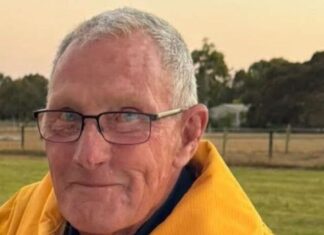BURIED among the hundreds of everyday emails in Jonathan Crabtree’s inbox are a few worth keeping.
Replies from Nelson Mandela, Bishop Desmond Tutu, the Dalai Lama, even Muhammad Ali are quickly printed out and put aside for safe keeping.
They are a reminder of the power behind the written word; that ordinary people can make a difference.
“I haven’t got one from the President of the United States or the Pope yet,” Jonathan says, “but I’ll get there soon.
“The emails are not really that important – it’s much more about the ideas.”
The world is not big enough for Jonathan’s ambitious plans.
Not satisfied with raising about $100,000 off his own back for several charities over the years, the enthusiastic GMHBA manager by day has set a life goal of $1 million.
Bigger still is inking 2015 to 2020 into his diary for rounding up support around the planet to stop preventable child starvation.
His latest idea is World Message Day, in which billions of people could click on a text message or email in a global survey of their number-one priority for the future. The results would go to world leaders.
“I guess changing the world is one way of describing it but maybe it’s more about helping the world to make it a better place while I’m here,” Jonathan reckons.
“But changing the world is a lot easier than people think.”
Life for Jonathan has been about leaving something interesting to say for his eulogy ever since a truck trying to beat a red light 25 years ago nearly left him dead on the road after colliding with his motorcycle.
Lying motionless on the ground, Jonathan could only remember the horizon spinning around as if he were in a plane going down.
Consequently, the driver lost his licence but the penalty was far worse for Jonathan whose spine resembled a “violet crumble being smashed by a mallet”.
He couldn’t move for months in bed and fainted the first time he was rolled onto his side because the blood supply to his brain was not used to flowing to his head.
“I should have been left a paraplegic,” he reflects.
“It made me really decide to do something substantial with my life.
“When you’re faced with your own mortality, it makes you wonder what legacy you’re going to leave behind.”
The accident motivated Jonathan in 1989 to make a “brain tune-up” cassette.
The 48-year-old also founded Buzz, which was shortlisted last year as one of the best social networking websites alongside My Space and RSVP.
After losing a daughter during childbirth, Jonathan put his energies into helping other children with their biggest fear at school.
He quit his job as a management consultant and, despite no formal qualifications, took up teaching mathematics from home.
“I actually failed maths,” he laughs.
Throwing away the classroom text books, Jonathan taught kids to imagine algebra by closing their eyes and listening to fairytales.
Education authorities in Australia first shunned Jonathan’s unorthodox methods when he created Australian numerals to make maths easier.
The system has already been taught to 5000 students, mainly in India, and Jonathan now plans to give away 1000 free CDs to Geelong students before the next school year commences in 2010.
“It has solved a problem that no one ever knew existed but which I imagined,” he reveals.
“I was working on it for over 20 years and all of a sudden it came into my head.”
Jonathan’s system uses a set of words and symbols to help kids overcome problems understanding numbers with negative values.
Minus, two and three become pun, poo and pee to keep kids laughing and make a game out of maths.
“When they learn that, and I can teach it to children in 10 minutes, they can master it in less than half an hour,” Jonathan boasts.
Think bigger
Digital Edition
Subscribe
Get an all ACCESS PASS to the News and your Digital Edition with an online subscription
Honouring Tim Monahan
A funeral service will be held in Queenscliff to honour and celebrate the life of a firefighter who spent his time supporting his community....








